


Together with UPM Raflatac, MULTIVAC has defined a standard program of stock label materials, capable of being printed and converted to full wrap labels easy to process on MULTIVACs conveyor belt labeller L 310.
When one considers the range of label materials, which can be run on MULTIVAC labellers, there are virtually no limits in terms of the nature and thickness of the materials. The standard program includes paper based but also plastic materials in different qualities which are easy to print and convert with standard equipment.
As the labels are held in effect by the backing material, the system offers a high flexibility with regards label forms. For example, labels with curves and cut-outs are possible in order to match with the particular product or pack.


The labelling solutions can be designed very flexibly for a wide range of pack shapes and materials, so the optimum labelling result will always be achieved.
A typical application are skin packs with different heights of product protrusion or also with products that are lower than the tray itself. Since unprinted upper webs are mostly used on skin packs, the label plays an important role with these packs in distinguishing the product. Full wrap labels can also be used on thermoformed MAP packs or trays in a wide range of shapes. The even surface of these packs offers multiple positions where the labels can be placed. Also clamshells, which are widely used for ready-made salads, fresh fruit or bakery products, can benefit from an improved shelf impact provided by full wrap labelling. In this case, the label also serves the purpose of sealing the clamshell.

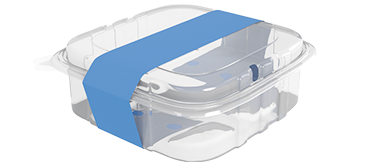

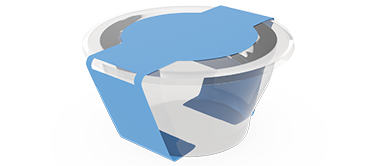
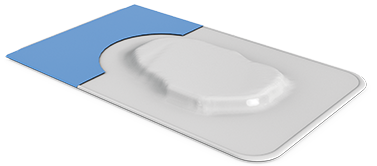
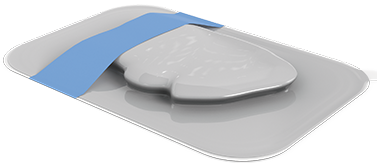
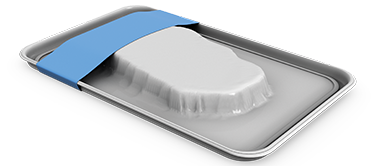
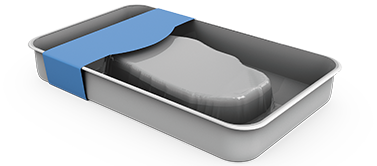
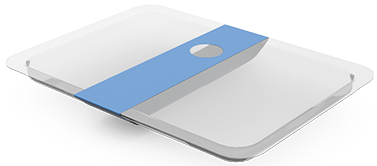
Due to their flexibility in size and form, the full wrap labels offer a maximum area for branding and product information and do not block product visibility. Full wrap labels also give promotional possibilities on the reverse side which are visible only after the purchase of the product. As food packs are often piled up in the shelf, full wrap labels will increase the visibility of the product in the shelf.
In order to allow full visibility of the packed product, transparent label materials can also be used.
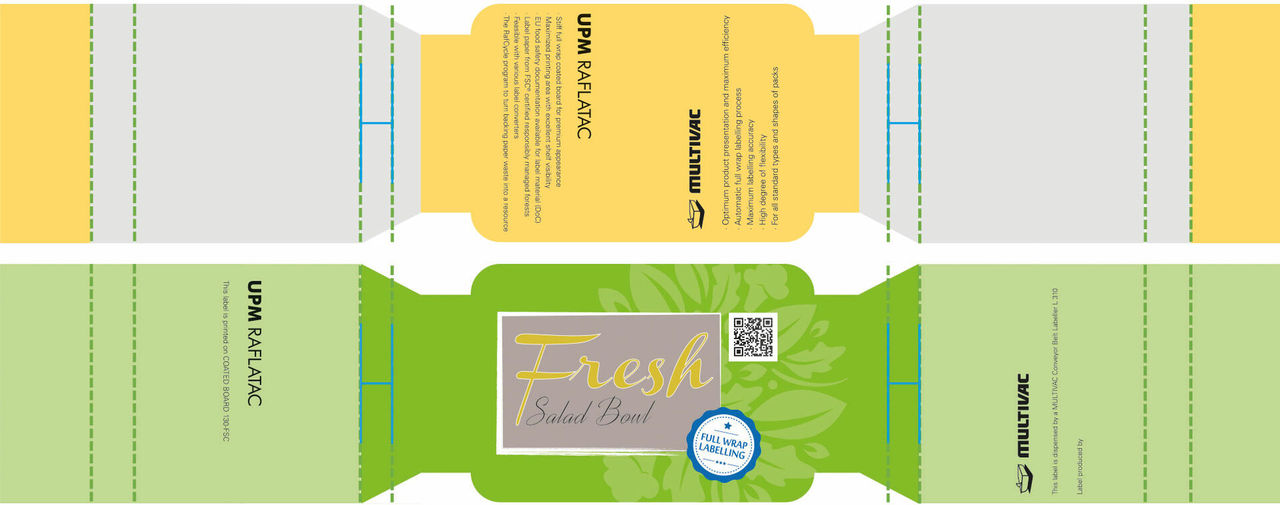
MULTIVAC’s labelling solutions offer users a high degree of automation, as well as maximum labelling accuracy. If required, the conveyor belt labellers can also be equipped with extra label dispensers so additional labels beside the full wrap label can be applied to the pack. One example of this would be promotional labels, which are increasingly being used for packs on the fresh food shelves.


MULTIVAC’s labelling solutions offer users a high degree of automation, as well as maximum labelling accuracy. If required, the conveyor belt labellers can also be equipped with extra label dispensers so additional labels beside the full wrap label can be applied to the pack. One example of this would be promotional labels, which are increasingly being used for packs on the fresh food shelves.
With the RafCycle® by UPM Raflatac program, backing paper from the full wrap labels can be recycled and turned into new paper or other materials. The backing paper recycling provides numerous benefits to printers, packers, and brand owners. It helps to reduce waste disposal costs and help contribute to the circular economy.
Cardboard sleeves, which have a high quality image to the brand, have to be processed manually and require an additional label on the rear to attach the sleeve to the pack. Due to that fact, this type of packaging involves significant extra cost when compared with automatic full wrap labelling.
Full wrap labelling can therefore offer an attractive alternative, particularly when paper labels with a higher grammage are used. By incorporating scores, i.e. pre-determined creases in the label, the high-quality sleeve look can even be enhanced.
In addition to the advantage of high-level automation, full wrap labelling also offers the benefit of security. One aspect here is that self-adhesive labels do not fall off as easily as cardboard sleeves during logistic processes such as secondary packaging, transport or in-store shelf filling. A second asset in terms of security is that customers have no possibility of switching the label against that of a similar but lower-priced product.
Especially with regards design and shape, full wrap labels benefit from a greater flexibility. Whereas “linerless” labels can only be produced in a rectangular format, all shapes can be considered for self-adhesive labels, since they are “held” in effect by the carrier paper. Labels with curves or cut-outs for example are possible with self-adhesive labels, which means they can be matched to the shape of the particular product or pack. This also applies to the range of materials, which can be used for the production of self-adhesive labels – this is much wider than for “linerless” labels, since the carrier material for the self-adhesive labels has a stabilising effect on the label material.
Another aspect, which restricts the efficiency of “linerless” labelling systems, is the fact that running these materials causes increased cleaning work on the machine. Labelling machines for running “linerless” labels also have to be equipped with knives, so the labels can be cut from the endless label stock. Residue of the adhesive or silicone layer on the labels builds up on these knives, which means they have to be cleaned regularly in order to maintain optimum labelling. The machine running time is therefore reduced significantly.
19.09.2018